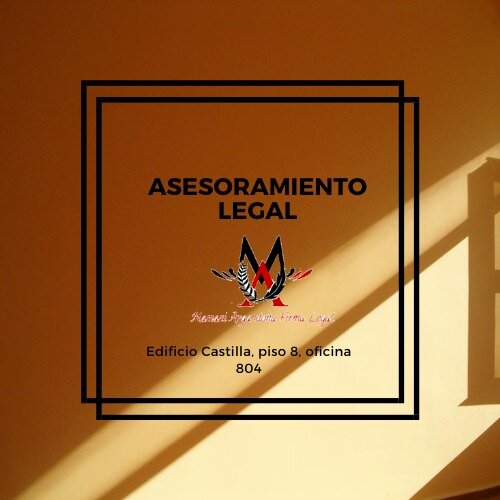Best Investment Lawyers in Bolivia
Share your needs with us, get contacted by law firms.
Free. Takes 2 min.
Or refine your search by selecting a city:
List of the best lawyers in Bolivia
About Investment Law in Bolivia
Investment in Bolivia is influenced by a variety of economic policies and legal frameworks designed to promote economic growth and stability. The Bolivian government aims to attract foreign investment while promoting national industries and sustainability. The investment landscape in Bolivia is governed by multiple laws and regulations, including the Constitution of Bolivia, the Investment Promotion Law, and relevant sector-specific regulations. These laws establish the rights and obligations of investors, set conditions for foreign direct investments, and delineate processes for resolving investment disputes.
Why You May Need a Lawyer
Navigating the investment landscape in Bolivia can be complex, involving a range of legal and regulatory requirements. Here are some common situations where you might need legal assistance:
- Establishing a Business Entity: Legal advice can help ensure compliance with local regulations when setting up a new business or partnership.
- Acquiring Property: When purchasing property for investment, a lawyer can assist with due diligence and navigate property laws.
- Contract Negotiation: Lawyers can facilitate negotiations and the drafting of contracts to protect your interests.
- Regulatory Compliance: Legal professionals can aid in understanding and adhering to local regulatory requirements across various sectors.
- Dispute Resolution: In case of legal disputes, lawyers offer representation and mediation services to find amicable resolutions.
Local Laws Overview
Investment laws in Bolivia encompass a range of regulations and requirements that are crucial for investors. Key aspects include:
- Investment Promotion Law: Provides incentives for foreign and domestic investors, focusing on areas such as technology, infrastructure, and social development.
- Sector-Specific Legislation: Each sector, such as mining, hydrocarbons, and telecommunications, has its own legal framework governing investment activities.
- Property Rights: Bolivia recognizes both private and communal land ownership, and property transactions must comply with national laws and regulations.
- Foreign Exchange Controls: Investors must adhere to specific rules regarding currency exchange and repatriation of profits.
- Environmental Regulations: Investments need to comply with environmental standards to promote sustainable development.
Frequently Asked Questions
What is the process for establishing a business in Bolivia?
You must register the business with the National Tax Service and the Chamber of Commerce. It's beneficial to consult a lawyer to ensure compliance with all legal requirements.
Are there restrictions on foreign ownership of land in Bolivia?
Foreigners can own land in Bolivia but must comply with certain restrictions, especially near borders. Legal advice can help navigate these regulations.
What are the incentives for foreign investors in Bolivia?
The government offers tax incentives and legal protections under the Investment Promotion Law to encourage foreign investment in key sectors.
How are investment disputes resolved in Bolivia?
Disputes may be resolved through arbitration or the national courts, depending on the nature of the investment and any existing agreements.
What are the key taxes for investors in Bolivia?
Relevant taxes include corporate income tax, VAT, and property tax. The specific liabilities depend on the sector and nature of the investment.
Can investors repatriate profits from Bolivia?
Yes, but investors must comply with foreign exchange controls and taxation policies. Legal advice is recommended for navigating these procedures.
What environmental regulations affect investments in Bolivia?
Investors must comply with national environmental laws, which may require impact assessments and sustainability practices.
Is it necessary to have a local partner for foreign investment?
While not required across all sectors, having a local partner can be advantageous for navigating regulatory and cultural landscapes.
How can I ensure my intellectual property is protected in Bolivia?
Registering trademarks and patents with the national authorities is crucial to protecting intellectual property rights.
What role does the Bolivian government play in investment?
The government regulates investment policies, provides incentives, and ensures compliance with national and international standards.
Additional Resources
Below are some resources that may be helpful for those seeking legal advice related to investment in Bolivia:
- Bolivian Chamber of Commerce: Offers information and support for businesses.
- Ministry of Economic Development: Governs economic policies and investment promotion.
- National Tax Service: Responsible for tax regulations and compliance.
- International Investment Organizations: Provide insights and data on global investment trends affecting Bolivia.
Next Steps
If you need legal assistance navigating investment laws in Bolivia, consider the following steps:
- Research Law Firms: Look for firms with expertise in Bolivian investment law.
- Consult Experts: Schedule consultations to discuss your specific needs and get advice tailored to your situation.
- Document Preparation: Gather necessary documentation to facilitate smoother legal processes.
- Understand Costs: Discuss legal fees and billing practices to budget accordingly.
Engaging a knowledgeable lawyer is often invaluable in safeguarding your investments and ensuring compliance with Bolivian laws.
Lawzana helps you find the best lawyers and law firms in Bolivia through a curated and pre-screened list of qualified legal professionals. Our platform offers rankings and detailed profiles of attorneys and law firms, allowing you to compare based on practice areas, including Investment, experience, and client feedback.
Each profile includes a description of the firm's areas of practice, client reviews, team members and partners, year of establishment, spoken languages, office locations, contact information, social media presence, and any published articles or resources. Most firms on our platform speak English and are experienced in both local and international legal matters.
Get a quote from top-rated law firms in Bolivia — quickly, securely, and without unnecessary hassle.
Disclaimer:
The information provided on this page is for general informational purposes only and does not constitute legal advice. While we strive to ensure the accuracy and relevance of the content, legal information may change over time, and interpretations of the law can vary. You should always consult with a qualified legal professional for advice specific to your situation.
We disclaim all liability for actions taken or not taken based on the content of this page. If you believe any information is incorrect or outdated, please contact us, and we will review and update it where appropriate.
Browse investment law firms by city in Bolivia
Refine your search by selecting a city.

















